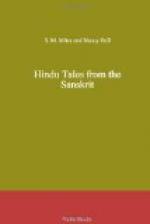This was done in the presence of the whole court, and when judgment had been passed upon Ayasolekha, the brothers of Sringa-Bhuja were also brought before their father, who charged them with having deceived him. They too were condemned, and all the culprits would have been taken to prison and shut up for the rest of their lives, if those they had injured had not pleaded for their forgiveness. Guna-Vara and her son prostrated themselves at the foot of the throne, and would not rise till they had won pardon for their enemies. Ayasolekha and the brothers were allowed to go free; but Sringa-Bhuja, though he was the youngest of all the princes, was proclaimed heir to the crown after his father’s death. His brothers, however, never ceased to hate him; and when he came to the throne, they gave him a great deal of trouble. He had many years of happiness with his wife and parents before that, and never regretted the mistake about the jewelled arrow; since but for it he would, he knew, never have seen his beloved Rupa-Sikha.
25. What is the chief lesson to be learnt from this story?
26. Do yon think it was good for those who had told lies about Guna-Vara and her son to be forgiven so easily?
27. Can you give any instances of good coming out of evil and of evil coming out of what seemed good?
28. Do you think Rupa-Sikha deserved all the happiness that came to her?
STORY VI
The Beetle and the Silken Thread. [2]
CHAPTER I
The strange adventures related in the story of the Beetle and the Silken Thread took place in the town of Allahabad, “the City of God,” so called because it is situated near the point of meeting of the two sacred rivers of India, the Ganges, which the Hindus lovingly call Mother Ganga because they believe its waters can wash away their sins, and the Jumna, which they consider scarcely less holy.
The ruler of Allahabad was a very selfish and hot-tempered Raja named Surya Pratap, signifying “Powerful as the Sun,” who expected everybody to obey him without a moment’s delay, and was ready to punish in a very cruel manner those who hesitated to do so. He would never listen to a word of explanation, or own that he had been mistaken, even when he knew full well that he was in the wrong. He had a mantri, that is to say, a chief vizier or officer, whom he greatly trusted, and really seemed to be fond of, for he liked to have him always near him. The vizier was called Dhairya-Sila, or “the Patient One,” because he never lost his temper, no matter what provocation he received. He had a beautiful house, much money and many jewels, carriages to drive about in, noble horses to ride and many servants to wait upon him, all given to him by his master. But what he loved best of all was his faithful wife, Buddhi-Mati, or “the Sensible One,” whom he had chosen for himself, and who would have died for him.




